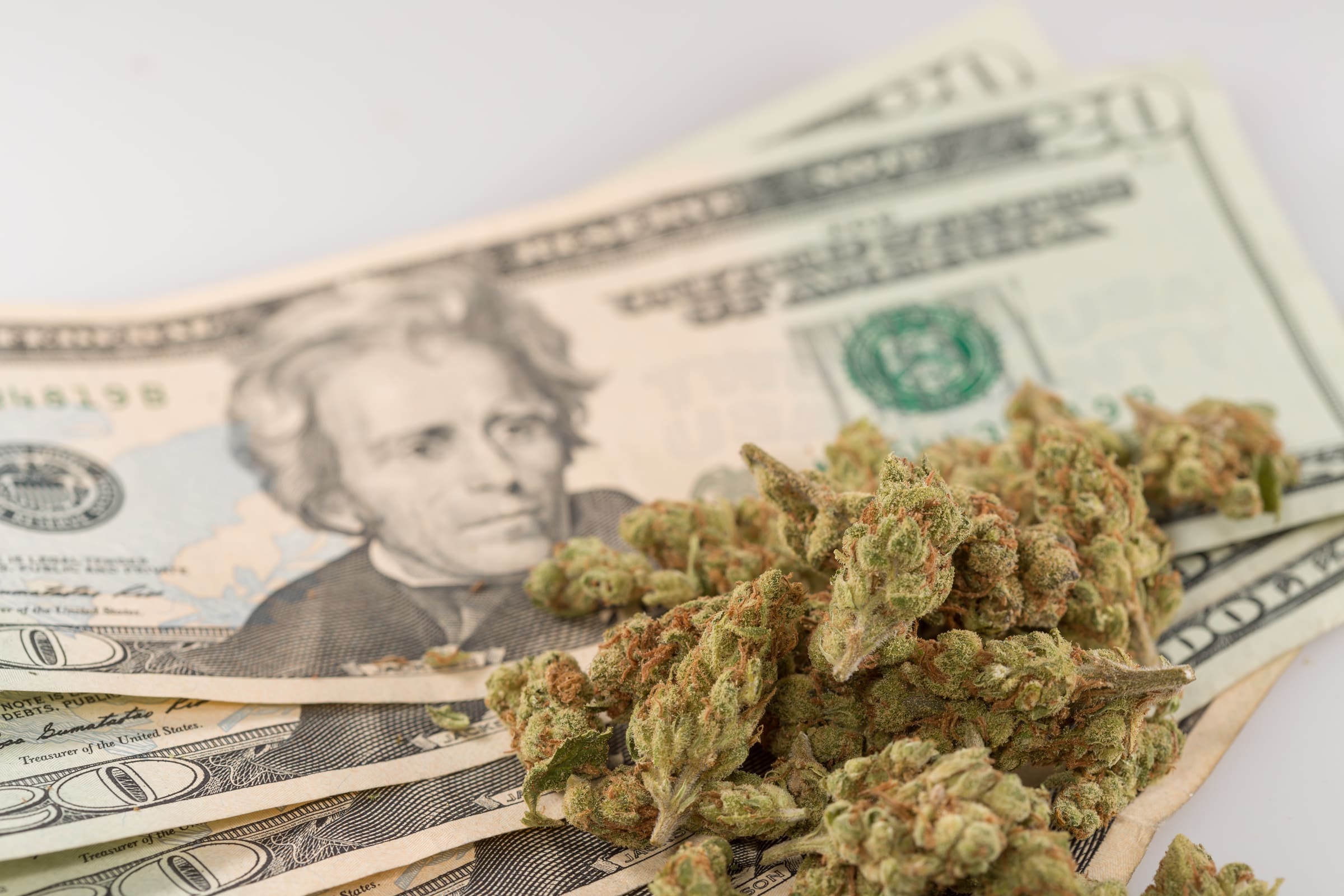Politics
Marijuana Banking Bill Reintroduced In Congress With Broad Bipartisan Support From More Than 100 Lawmakers

A bill to protect banks that service state-legal marijuana businesses from being penalized by federal regulators has again been filed in the House.
Rep. Ed Perlmutter (D-CO) reintroduced the legislation, titled the Secure and Fair Enforcement (SAFE) Banking Act. The measure cleared the House along largely bipartisan lines during the last Congress, but it did not advance in the Senate under Republican control.
With Democrats now in control of the House, Senate and White House, industry stakeholders are optimistic that the legislation stands a solid chance of becoming law this year.
The bill as introduced has 102 initial cosponsors, with Reps. Steve Stivers (R-OH), Nydia Velazquez (D-NY) and Warren Davidson (R-OH) taking the lead alongside Perlmutter. By the end of the 116th Congress, the prior version of the bill garnered 206 cosponsors. The current bill includes support from 13 Republicans.
A new companion Senate version of the bill is expected to be filed next week.
The SAFE Banking Act would ensure that financial institutions could take on cannabis business clients without facing federal penalties. Fear of sanctions has kept many banks and credit unions from working with the industry, forcing marijuana firms to operate on a cash basis that makes them targets of crime and creates complications for financial regulators.
The bill has been slightly revised this session to expand banking protections to explicitly include hemp and CBD businesses, and some technical changes were made to clarify language around insurance and safe harbor provisions. A separate bill to address insurance issues in the cannabis market was also introduced in the Senate on Thursday.
“Thousands of employees and businesses across this country have been forced to deal in piles of cash for far too long,” Perlmutter said in a press release. “It is time to enact SAFE Banking to align federal and state laws and reduce the public safety risk in our communities.”
Today I reintroduced #SAFEBanking to align federal & state laws for the safety of constituents & communities across the country. The genie is out of the bottle & has been for many years. Thousands of employees & businesses have been forced to deal in piles of cash for too long.
— Rep. Ed Perlmutter (@RepPerlmutter) March 18, 2021
“I appreciate the partnership of the cannabis industry and businesses across this country who have added their voice to this effort,” he added. “The SAFE Banking Act is an important first step to treating cannabis businesses like legal, legitimate businesses and beginning to reform our federal cannabis laws.”
This is the first of many cannabis reforms Congress needs to address. It's time for Congress to act. https://t.co/htsFdaFYKR
— Rep. Ed Perlmutter (@RepPerlmutter) March 18, 2021
Stivers said that “we have a responsibility to legislate for the reality we live in, and the reality is that legal businesses in thirty-three states, including Ohio, are being denied access to the banking system and forced to assume huge risks as a result of operating solely in cash.”
Velazquez added that “the cannabis industry has been operating with great success, with many of these businesses deemed essential as the coronavirus pandemic took hold.”
“However, without the ability to safely utilize the banking system, cannabis-related businesses are left behind and stuck resorting to tactics that can threaten public safety and economic success,” she said.
In the past year, Portland cannabis shops were robbed, burglarized, or looted more than 100 times. According to @WWeek, workers have been threatened at gunpoint, zip-tied, and targeted for just doing their jobs. Tragically, we've lost one Portland cannabis worker to the violence.
— Earl Blumenauer (@repblumenauer) March 18, 2021
As more states have legalized marijuana for recreational or medical use, banks have relied on 2014 guidance from the Financial Crimes Enforcement Network (FinCEN) that requires them to submit suspicious activity reports if they elect to provide financial services to cannabis businesses. In the years since, the number of depositories taking on marijuana clients has gradually increased—until a more recent downward trend that now seems to be stabilizing.
The head of the Internal Revenue Service (IRS) told Congress last month that the federal agency would “prefer” for state-legal cannabis firms to be able to pay taxes electronically, as the current cash-based system under prohibition is onerous and presents risks to workers.
Former Treasury Secretary Steven Mnuchin similarly said in 2019 that he’d like to see Congress approve legislation resolving the cannabis banking issue, and he pointed to the fact that IRS has had to build “cash rooms” to deposit taxes from those businesses as an example of the problem.
In addition to being approved as a standalone bill in 2019, the SAFE Banking Act also passed in the House after leadership attached its language to two pieces of coronavirus relief legislation last year. But they declined to add it to their latest version signed into law by President Joe Biden this month, despite having reclaimed the majority in both chambers and the White House.
—
Marijuana Moment is already tracking more than 900 cannabis, psychedelics and drug policy bills in state legislatures and Congress this year. Patreon supporters pledging at least $25/month get access to our interactive maps, charts and hearing calendar so they don’t miss any developments.
![]()
Learn more about our marijuana bill tracker and become a supporter on Patreon to get access.
—
Cannabis reform advocates and industry representatives cheered the bill’s reintroduction.
“At a time when small businesses need all the support they can get, and after cannabis businesses specifically have been providing essential services and generating significant tax revenues for states and the federal government with little to no financial relief, it is more imperative than ever to get the SAFE Banking Act passed into law,” Aaron Smith, CEO of the National Cannabis Industry Association, said. “Lack of access to banking services continues to create serious unnecessary issues for public safety, transparency, and access to traditional lending that smaller operators desperately need.
Steve Hawkins, interim president of the U.S. Cannabis Council (USCC), said that while the group is awaiting additional reform legislation this Congress, the SAFE Banking Act “is integral to the success of the responsible cannabis industry of the future.”
“This essential step forward will positively impact social equity candidates often redlined from receiving financial backing and even access to traditional banking services,” he said. “The SAFE Banking Act provides access to financial services such as small business loans, which create equal opportunity, ensuring more diverse representation within the industry.”
Chanda Macias, vice chair of the National Cannabis Roundtable, called the bill a “win, win, win, for providers and their communities.
“It will create more jobs, more opportunity and more public safety,” she said. “We will work hard for passage of this key piece of bipartisan cannabis reform in this Congress.”
After the legislation passed the House last Congress, advocates and stakeholders closely watched for any action to come out of the Senate Banking Committee, where it was referred after being transmitted to the chamber. But then-Chairman Mike Crapo (R-ID) did not hold a hearing on the proposal, despite talk of negotiations taking place regarding certain provisions.
Sen. Sherrod Brown (D-OH), who took the top seat in that panel after Democrats secured a majority in the Senate, told reporters in February that he’s “willing” to move the cannabis banking bill, but added that it “needs to come sentencing reform.”
“I don’t think we move on legalization the way that Colorado and some other states want us to, unless we really look more seriously at who’s in prison for how long for those kinds of offenses and we don’t do one without the other,” he said.
The new version of the Senate cannabis bill, expected to be filed next week, will be carried by Sens. Jeff Merkley (D-OR) and Steve Daines (R-MT)
“No one working in a store or behind a register should have to worry about experiencing a traumatic robbery at any moment. That means we can’t keep forcing legal cannabis businesses to operate entirely in cash—a nonsensical rule that is an open invitation to robbery and money laundering,” Merkley said in a press release. “Let’s make 2021 the year that we get this bill signed into law so we can ensure that all legal cannabis businesses have access to the financial services they need to help keep their employees safe.”
Daines added that the bill “will help Montana small businesses, create jobs, boost local economies, and improve public safety.”
“Montana business owners should have the ability to freely use banks, credit unions and other financial institutions without the fear of punishment,” he said.
When the standalone legislation was scheduled for a vote in 2019, there was pushback from some advocates who felt that Congress should have prioritized comprehensive reform to legalize marijuana and promote social equity, rather than start with a measure viewed as primarily friendly to industry interests.
Meanwhile, congressional lawmakers are simultaneously preparing to introduce legislation to end federal cannabis prohibition.
Senate Majority Leader Chuck Schumer (D-NY), Senate Finance Chairman Ron Wyden (D-OR) and Sen. Cory Booker (D-NJ) are in the process of crafting a legalization bill, and they’ve already met with advocates to get feedback on how best to approach the policy change.
Schumer has said lawmakers must pursue broad justice-focused cannabis legislation and not stop at the industry-favored financial reform.
“Congress should not enact banking reform alone and think the job is done,” he tweeted in 2019. “We need decriminalization at the federal level, criminal justice reform, and investment in opportunity for minority & women-owned small businesses.”
.@RepAOC and these civil rights groups are right.
Congress should not enact banking reform alone and think the job is done.
We need decriminalization at the federal level, criminal justice reform, and investment in opportunity for minority & women-owned small businesses. https://t.co/PM22Bmk5Pl
— Chuck Schumer (@SenSchumer) September 19, 2019
It’s not clear if those views indicate that he opposes moving the SAFE Banking act ahead of a bill to end prohibition, or if he would allow it to come to the floor with the understanding the broader reform would follow.
House Judiciary Chairman Jerrold Nadler (D-NY) also recently said that he would be reintroducing the Marijuana Opportunity, Reinvestment and Expungement (MORE) Act, which would federally deschedule cannabis and contains a number of social equity provisions. That proposal passed in the House last year.
The American Bankers Association (ABA), for its part, says it’s important to advance marijuana banking reform. While the group doesn’t have a formal position on broader reform, it said in a letter to Perlmutter and other sponsors of the new version of the SAFE Banking Act on Wednesday that the cannabis financial services issue “has become a challenge for so many of our nation’s communities and the banks that serve them.”
“The bipartisan SAFE Banking Act would be an important step toward enabling financial services for cannabis-related businesses,” ABA wrote. “The SAFE Banking Act is not a cure all for the cannabis banking challenge, but it is a measure that helps clarify many issues for the banking industry and regulators.”
“Providing a mechanism for the cannabis industry to access the banking system would help those communities reduce cash-motivated crimes, increase the efficiency of tax collections, and improve the financial transparency of the cannabis industry,” the group said.
Perlmutter’s office said the bill is also being supported by the Credit Union National Association, Independent Community Bankers of America, National Association of Realtors, United Food and Commercial Workers and other groups.
Read the full text of the newly filed SAFE Banking Act below:
The SAFE Banking Act of 2021 by Marijuana Moment
Bipartisan Senate Bill Would Give Marijuana Businesses Access To Insurance Coverage
















